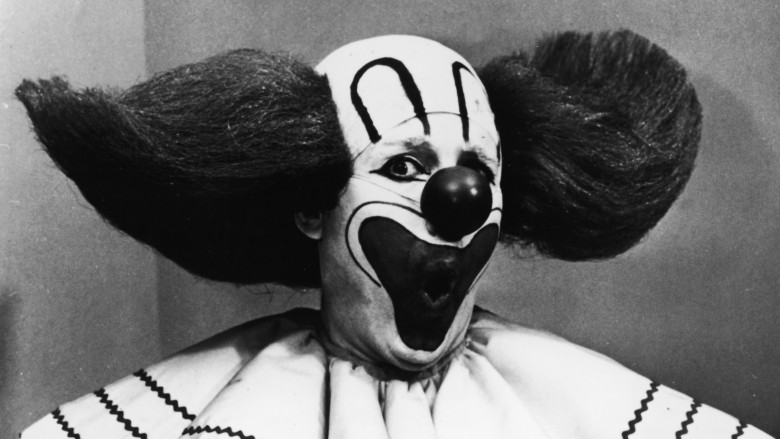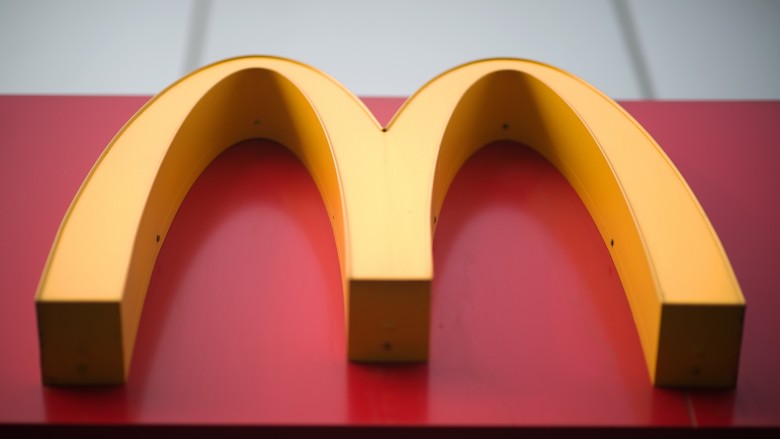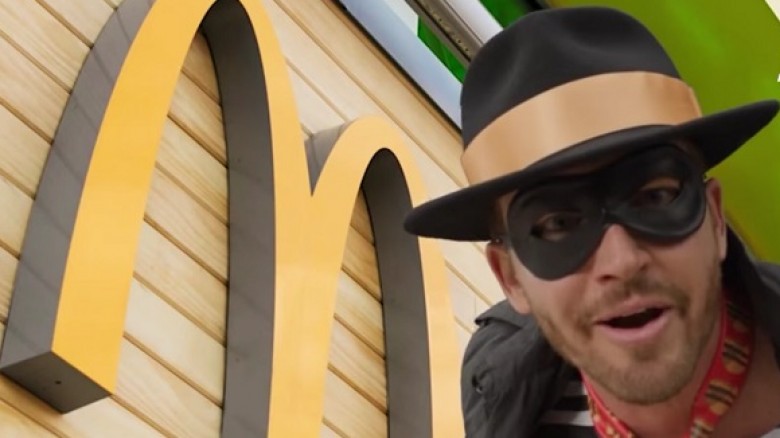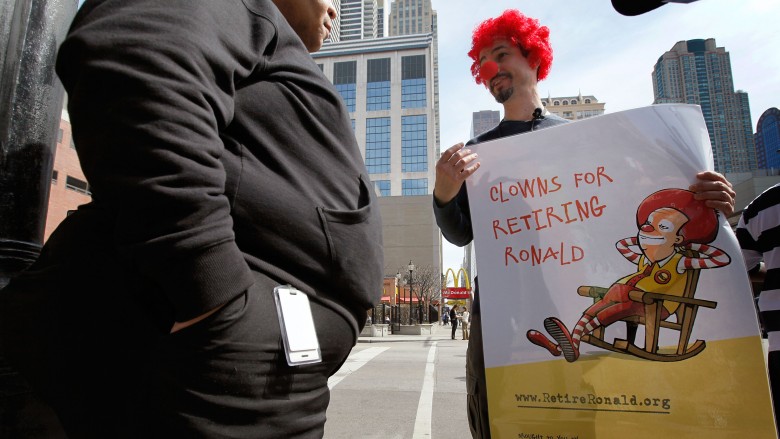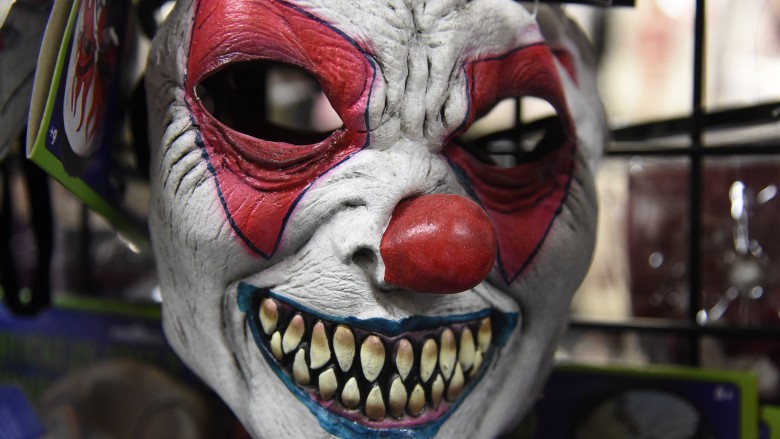The Weird History Of Ronald McDonald
It is seemingly impossible to escape the lure of McDonald's. Much like Jason Voorhees, run as hard as you want, but everywhere you turn, there it is, staring at you with its golden arches. Resistance is futile. At the center of the McDonald's universe, holding it all together for generations, is the cherry-red smile of the infamous Ronald McDonald. While the mere mention of McDonald's invokes images of pure Americana, Ronald's white face-paint, carrot-top hair and peering smile masks a more oddball history. Grab your fries, kids.
Ronald was a replacement
Let the truth be told: Ronald started life as a scab.
In the Washington, D.C., area, Bozo the Clown, a children's TV character that was franchised locally and played by different performers in different markets, was used to help promote the local McDonald's franchise, owned by Oscar Goldstein and John Gibson. When Bozo went off the air in the D.C. marketplace, "Ronald McDonald, the Hamburger-Happy Clown" appeared faster than The Fresh Prince of Bel-Air could recast Aunt Viv. One second, Bozo was there, then Ronald burst upon the scene. Gullible children were none the wiser, and they continued to gobble burgers.
Clad in a yellow jumpsuit and striped shirt, early Ronald wore a paper cup for a nose and a tray for a hat while a complete McDonald's meal hung from his belt buckle. Today, the Fashion Police would be blasting sirens, but the 1960s were a more colorful and accepting time. At least for clowns.
While Bozo faded into the past as a warmly-regarded nostalgia act, Ronald began to build his empire upon the foundation his predecessor had left behind. After just three local D.C. commercials, the clown was plucked from obscurity to star in national commercials. A star was born, but poor Bozo would never be publicly credited as Ronald's forefather. Pie to the face for you, Bozo!
His creator was ignored for decades
While credited by McDonald's as the first performer to portray Ronald McDonald, the fast food kings have been less than forthcoming with the role famous television weatherman Willard Scott had in creating Ronald. They never told you the truth, Ronald. He is your father.
In his 1982 book Joy of Living, Scott wrote that the owners of the local Washington, D.C., McDonald's franchise hired him to come up with the burger-boosting replacement for Bozo the Clown. A local radio personality at the time, Scott took center stage in a trio of McDonald's commercials as the clown, including one ensuring the flower power generation was indeed aware of Stranger Danger.
Ray Kroc, responsible for the franchise's expansion nationally and beyond, sensed potential, promoting Ronald to national mascot. Scott, however, was cast aside, and the role was recast. Much as Kroc left the McDonald brothers in the dust, Ronald abandoned Scott, who was uncredited for the role he originated, without as much as an Extra Value Meal to show for it.
Scott famously had a decades-long run as an NBC weatherman, but even he couldn't forecast that after he went public with his claims, McDonald's would remain silent, beyond a brief acknowledgement Scott was the first to portray Ronald. Brrrr. Talk about a cold front. Even more insulting, the official credit for Ronald's creation went to Oscar Goldstein, one of the franchise owners that tapped Scott to create Ronald to begin with.
Scott's role would continue to be ignored until March 2000, when NBC's Today Show aired a tribute to Scott that featured Henry Gonzalez, at the time President of McDonald's Northeast Division, finally thanking Scott for his role in creating Ronald. Scott would retire from television in 2015, but had he received royalties for siring Ronald, certainly he'd have been long gone, lounging on some giant tropical island and basking in all his creative glory.
His best friend was evil
Everyone loves Grimace. He's Ronald's best friend, that jovial blob who popularized purple decades before Prince was singing about rain. However, it's been a deep-harbored secret that Grimace was not always as fun-loving — he used to be straight-up evil.
Evil Grimace, as he was originally coined, debuted as a four-armed thief out to steal milkshakes and sodas, only to be thwarted by Ronald, who tricked him into leaving all of the stolen goods behind by pretending to be a mailman delivering a fake invitation for a McDonald's beauty contest. Yes, this is how they sold burgers in the '70s. Groovy, man.
While Grimace may have been the scourge of McDonaldland when he debuted back in 1971, his reign of terror did not last long. After a few appearances, he was retconned into the dim-witted, happy right-hand man for Ronald we know today. They even cut off two of his arms.
Exactly how this happened in-universe has never been revealed. Was Evil Grimace apprehended and reprogrammed, A Clockwork Orange-style? McDonald's isn't talking, but it's possible. Such treatment might kill a mere mortal, for as we know, nothing can kill the Grimace.
He lived in a psychedelic nightmare
Everyone needs a place to hang their hat, right? Spokesclowns are no different, and in trippy days of the 1970s, his home, McDonaldland, was revealed. Featuring anthropomorphic characters designed to espouse the enrichment of the world through fast food, McDonaldland was complete sensory overload to children, with bright, colorful characters that looked as if they escaped Disney purgatory. Even better, you didn't need to go on vacation to see them — they were broadcast right to you, originally in a memorable series of commercials, before evolving into VHS adventures that McDonald's used to enrapture guests at children's birthday parties, along with some of the trippiest playgrounds of all time.
Presided over by Mayor McCheese, a politician who remains so beloved he was actually endorsed in the 2016 Presidential Election, McDonaldland was a fantastic fever dream, filled with apple pie trees and thick shake volcanoes — the magical place where Ronald and Grimace foiled the sinister plots of Hamburglar and others who sought to swipe McDonald's meals for themselves. These colossal battles of good vs. evil deftly balanced delivering moral lessons to kids while also accomplishing their true task: They Live-style subliminal advertising that McDonald's is yummy and awesome and kids should ask for it all the time. Indoctrinating the young is the key to repeat business. Ask the WWE.
Like Atlantis before it, McDonaldland was lost to time and the ever-changing whims of corporate America. Modern campaigns put the gang out to pasture. Still, future civilizations may one day come across the ruins of McDonaldland and assume we worshiped at the altar of a crazy clown in a yellow jumpsuit. Stranger things, indeed.
He was sued by H.R. Pufnstuf
When the McDonaldland ad campaign was launched, the colorful characters starring in madcap adventures certainly delighted thousands of children, but there was one family it didn't delight — The Kroffts. Brothers Sid and Marty Krofft ruled over their own magical puppet kingdom, and were at the height of their popularity at the time. They were the kings of the psychedelic '70s Saturday morning genre, so it was hardly a surprise when they were approached by McDonald's ad agency Needham, Harper and Steers and asked to sprinkle some of that unbridled creativity over Ronald's head. The two sides came to terms, but the agency soon yanked those plans.
So imagine The Kroffts' surprise when McDonaldland debuted and Mayor McCheese bore a striking resemblance to their own top creation, H.R. Pufnstuf. To make matters worse, the Krofft brothers later learned some of their former employees had also worked on the campaign, and the Ice Capades later declined to renew the usage of Kroft characters, in favor of the McDonaldland copycats. Faster than you can say Freddy the Flute, a lawsuit was launched from the Land of the Lost, with all parties soon sitting before a magical jury that was to decree whether The Kroffts' copyrights had been infringed.
The jury agreed with the Kroffts, but only awarded $50,000 in damages. Both sides flew like Birdie the Early Bird to an appeals court — The Kroffts, to get more of that Fry Guy cash, while McDonald's, like Captain Crook, wanted to escape scot-free. Testimony indicated that representatives of Needham had toured Krofft HQ even after they had opted not to go with the family, leaving McDonald's in quite the bind, legally. In the end, it was decided that The Kroffts were indeed owed some of that McDough, to the tune of $1,044,000. On top of that, McDonaldland commercials were shuttered. The Hamburglar did not escape this time, folks.
Moral of the story, kids? Who's your friend when things get rough? Lawyers, that's who.
McDonald's tried to put a real-life Ronald McDonald out of business
McDonald's is extremely protective and litigious over their brand. Just open any business that features a "Mc" and watch McLawyers descend upon you for a McBeating. So, it probably came as no surprise when McDonald's attempted to legally smack down Fairbury, Illinois, eatery McDonald's Family Restaurant over the use of the McDonald's name.
What was unique was that the owner and proprietor was one Ronald McDonald. No kidding. Ronald McDonald opened his 240-seat eatery in 1956. When corporate McDonalds became aware of this establishment, it began firing off legal letters and phone calls, warning the McDonald family that they were trading on McDonald's good name. In response, the family slightly changed the title, removing the possessive "s" from their name.
Not good enough for McDonald's: it then descended upon Fairbury and opened its own outlet, seeking to plant a flag and become the dominant local McDonald's. It was McDavid vs. McGoliath, for the hearts and stomachs of fair Fairbury.
The battle lasted three years, and, despite their corporate might, McDonald's found itself unable to uproot Ronald. They finally tapped out, shutting down their location. This led Ronald to snark, "Most of our customers tried it once and never went back. They say they don't miss it and they are glad we won out." A McDonald's spokesperson gave it their best spin, noting, "Closings rarely happen, because we are normally very good at site evaluation." Hey, Mike Tyson was great at knocking people out, too, but then he met Buster Douglas.
Victorious, Ronald even kicked a little dirt on his clownish cousin post-victory, adding the possessive "s" right back to the name of his own eatery, where it has remained to this very day. Fairbury remains McNugget-free for two decades and counting.
The Hamburglar is real
Debuting in 1971, the Hamburglar joined the Ronald's rogue's gallery, attempting, over and over, to commit grand theft burger and hoard McDonaldland's finest all for himself, but falling short every time. He's received a few makeovers over the years, going from red-headed stepchild to his most recent incarnation, where he came to life and swapped his trademark bush hat for a Twitter-trending fedora, until dropping off the radar again. Or did he?
In April 2016, international headlines were made when a mysterious hat-wearing suspect broke into a Five Guys restaurant in the Washington, D.C., area and promptly cooked himself a meal. Despite calls to the public for help in identifying this hardened criminal, authorities were unable to apprehend this menace to society. Officer Big Mac, asleep on the job. Robble robble!
The McMarketing may have gotten out of hand
Ronald and McDonaldland were specifically designed to market McDonald's to children, and in that regard, it did gangbuster business, not only in keeping registers ringing across the country, but in getting the characters out of the restaurants and into the hands of children as tangible playthings. There were action figures, plush dolls, McWrist Wallets, novelty records, McDonaldland playsets, VHS tapes, and playgrounds, some of which as dangerous as they were colorful.
In the late-'80s and early-'90s, that weirdness spread to the world of videogames. There was 1993's McDonald's Treasure Land Adventure for the Sega Genesis, where Ronald fights off pirates en route to tracking down a treasure map so they could return home via an intergalactic rainbow. Or, 1992's multi-platform MC Kids, where our heroes chase down Ronald's magic bag after it was stolen by the Hamburglar. Does Felix the Cat know about this?
All of this madness pales in comparison to the insanity of 1988's Japanese Famicom-only title Donald Land, where Ronald has to rescue all of his kidnapped friends from an evil clown named Gumon, fighting his own brainwashed friends and evil animals along the way. How did corporate approve this?
The licensing of Ronald across the board was all over the place, to be sure, but hey, it doesn't matter what we think. He's enshrined in the National Museum of American History — at least in doll form — forever, and we're not. So there.
He's a failed actor
While he's starred in countless commercials and home videos designed to build upon McDonald's propaganda, Ronald is also a failed film actor, with just one lone credit to his name. Box office bomb Mac & Me was released in 1988 as an attempt to cash-in on the hot alien craze that followed the release of Spielberg classic E.T. the Extra-Terrestrial. One can almost smell Hollywood deal-making in the air as the film unspools, taking the E.T. plot point that used Reese's Pieces to forge a bond between E.T. and Elliot, only attempting to Xerox that strategy to the umpteenth degree, throwing in any and all product placement the producers could force-feed the audience.
None of these attempts are more traumatizing than an entire sequence that takes place at a mythical McDonald's, where local children have congregated outside to break-dance. Ronald himself is there as the master of ceremonies for a children's birthday party that our hero, Eric, attends, secretly bringing his alien pal Mac along for the ride. With Mac safely hidden inside the skin of a teddy bear, this fever dream of a sequence leads to a huge dance number, because, well, it's the '80s.
Ronald was heavily involved in promoting the film, but, in the end, it's become a forgotten relic of the era, sucking the life out of viewers and Ronald's cinematic dreams alike. The Flashdance reboot will have to wait. Until that day, Ronald will have to settle for motivational speaking gigs.
There have been calls for his retirement
Ronald has been around for generations, a welcoming face to wave families in the door before they scarf down their McNuggets. In recent years, however, his once rock-solid show of support has slipped. As Aaron Eckhart famously said in The Dark Knight, "You either die a hero or live long enough to see yourself become the villain." To some, Ronald has become the sneaky villain, tricking generations into making terrible choices, like that last shot at closing time.
"This clown is no friend to our children or their health," proclaimed Corporate Accountability International, who called for Ronald's unceremonious retirement in 2010, bemoaning him as the key ingredient in the secret sauce of obesity. To some, Ronald, not irresponsible parenting, was the root cause of a fast food nation brimming with health issues.
While McDonald's did blink, in some regard, adding healthier fare on their menu, and introducing a slightly more grown-up hipster Ronald, in the end, the Southwest Salad and dialing down the kid-friendliness did little to change a nation's craving for a late night Big Mac. Pass the diabetes.
Creepy clowns almost did him in
Every Superman has his kryptonite. In 2016, it appears that Ronald McDonald's was discovered: creepy clowns. For inexplicable reasons, a plethora of creepy clowns descended upon planet Earth, popping up in major metropolitan cities and quiet towns alike.
Although there was no evidence that Ronald was culpable in this rising army of sinister clowns, he still shouldered some of the blame, since, for the first time, McDonald's decided it was going to distance itself. Admitting it was "mindful of the current climate around clown sightings in communities," the company opted to downplay Ronald's appearances in the company's many community and charity events. Although innocent, he was a persecuted clown.
Eventually, the sightings diminished, yet Ronald remains relegated to the shadows, his commercial run apparently far behind him. Until the tides change, one envisions him quietly waiting for the day when he gets to hold court while championing Big Macs yet again. Until then, tears of a clown. An innocent clown. Or was he?

